- Back to Home »
- 'My income makes me feel _______'
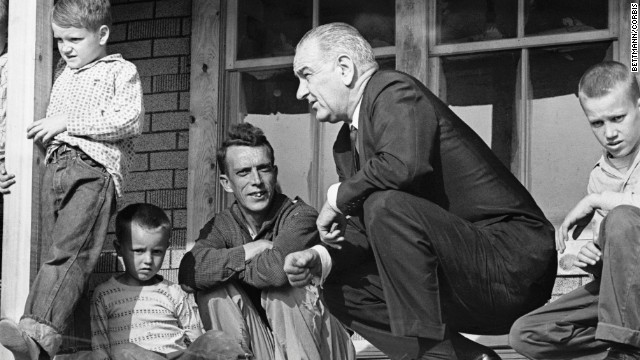 U.S. President Lyndon B. Johnson visits a family in Inez, Kentucky, during a tour of poverty-stricken areas of the country in April 1964. Earlier that year, Johnson declared a "war on poverty" in his State of the Union address. He then worked with Congress to pass more than 200 pieces of legislation, which included early education programs and social safety nets such as Medicare and Medicaid.
U.S. President Lyndon B. Johnson visits a family in Inez, Kentucky, during a tour of poverty-stricken areas of the country in April 1964. Earlier that year, Johnson declared a "war on poverty" in his State of the Union address. He then worked with Congress to pass more than 200 pieces of legislation, which included early education programs and social safety nets such as Medicare and Medicaid. 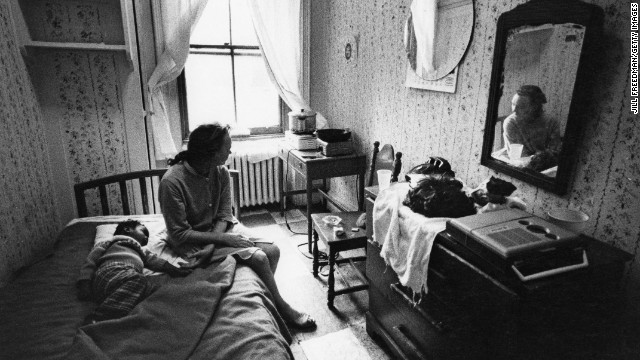 In 1971, a woman and child rest in their room at a New York City hotel for people living on welfare. Johnson's programs significantly reduced the poverty rate during his time in office, but it was still in the double digits (12.1%) when he left in 1969.
In 1971, a woman and child rest in their room at a New York City hotel for people living on welfare. Johnson's programs significantly reduced the poverty rate during his time in office, but it was still in the double digits (12.1%) when he left in 1969. 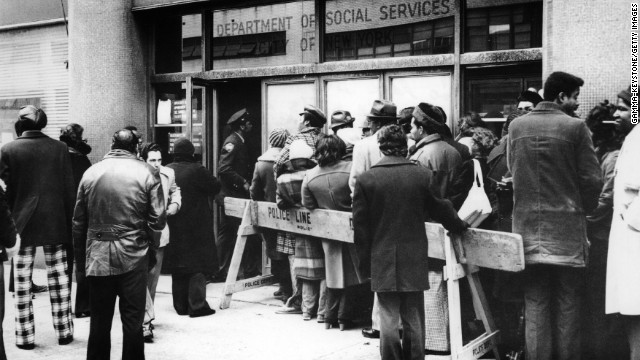 Unemployed Americans stand in line at a New York welfare office in 1974. Economic crises gripped the country in the early '70s and, in many ways, dampened America's focus on the war on poverty.
Unemployed Americans stand in line at a New York welfare office in 1974. Economic crises gripped the country in the early '70s and, in many ways, dampened America's focus on the war on poverty. 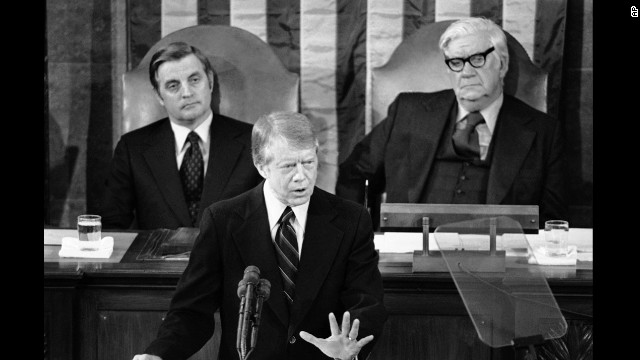 President Jimmy Carter, a man who rode into the White House as an anti-government Washington outsider, lessened the focus on the war on poverty. "Government cannot solve our problems," he said in his 1978 State of the Union address.
President Jimmy Carter, a man who rode into the White House as an anti-government Washington outsider, lessened the focus on the war on poverty. "Government cannot solve our problems," he said in his 1978 State of the Union address. 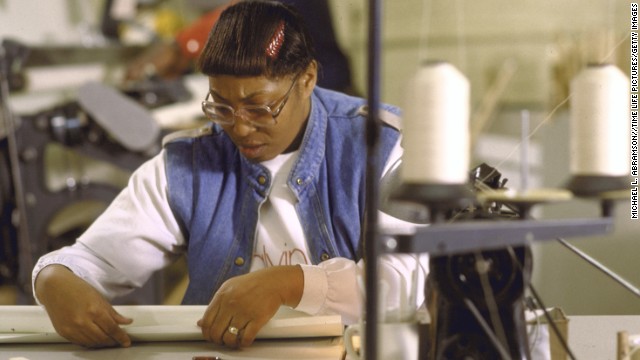 A woman in 1987 participates in a workforce program that trains and finds new jobs for people on welfare.
A woman in 1987 participates in a workforce program that trains and finds new jobs for people on welfare. 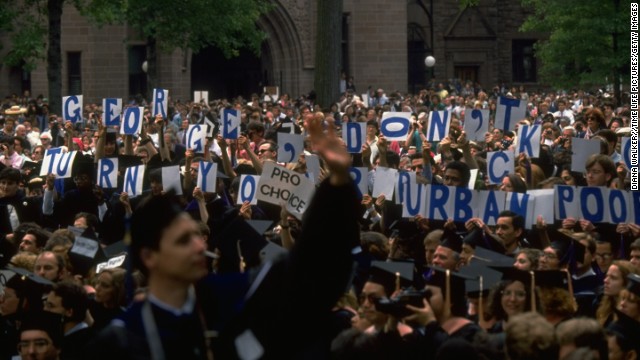 During a 1991 commencement speech given by President George H. W. Bush at Yale University, attendees hold signs that read, "George, don't turn your back on urban poor." Like Carter, Bush was more concerned with other issues during his presidency.
During a 1991 commencement speech given by President George H. W. Bush at Yale University, attendees hold signs that read, "George, don't turn your back on urban poor." Like Carter, Bush was more concerned with other issues during his presidency. 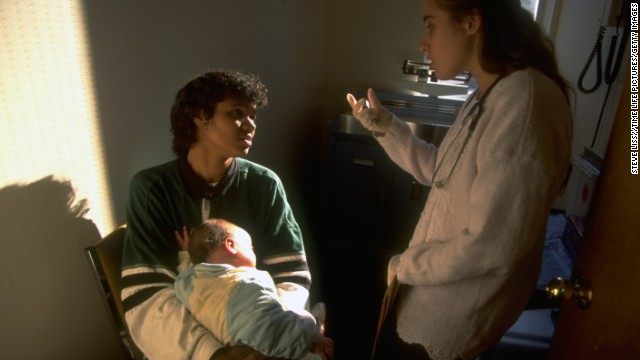 A Medicaid recipient brings her daughter to a hospital in 1995. Medicaid, a federally run health program, was designed to provide coverage for low-income and disabled individuals.
A Medicaid recipient brings her daughter to a hospital in 1995. Medicaid, a federally run health program, was designed to provide coverage for low-income and disabled individuals. 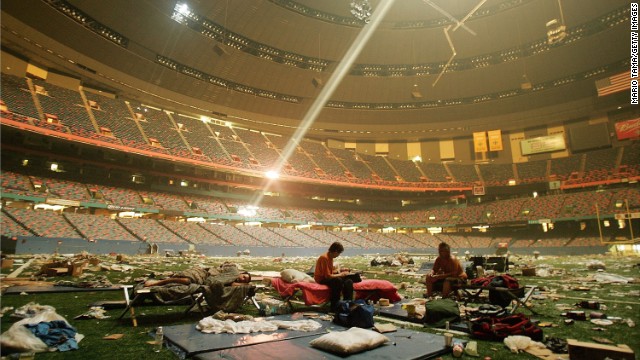 In 2005, displaced victims of Hurricane Katrina rest inside a shelter set up at the Superdome in New Orleans. Advocacy groups estimate homelessness in the city more than doubled in the aftermath of the storm. The disaster fueled dialogue on poverty and race relations in America.
In 2005, displaced victims of Hurricane Katrina rest inside a shelter set up at the Superdome in New Orleans. Advocacy groups estimate homelessness in the city more than doubled in the aftermath of the storm. The disaster fueled dialogue on poverty and race relations in America. 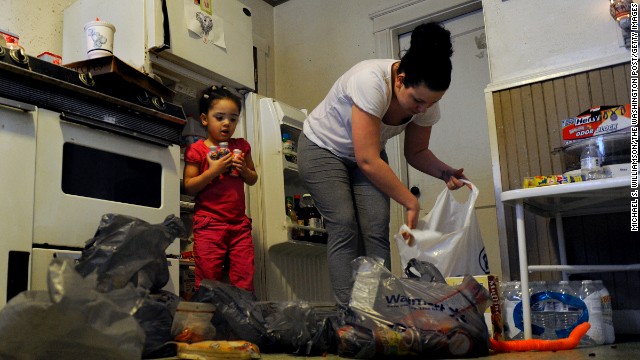 A mother unloads groceries purchased with food stamps in 2013. The federal food assistance program established by President Johnson in 1964 still helps many low-income Americans put food on the table today.
A mother unloads groceries purchased with food stamps in 2013. The federal food assistance program established by President Johnson in 1964 still helps many low-income Americans put food on the table today. - CNN iReport asks readers to say how their income makes them feel
- The assignment follows a series by John Sutter on income inequality
- Sutter reported on the "most unequal place in America"
- He says the war on poverty should morph into a war on inequality
Editor's note: John D. Sutter is a columnist for CNN Opinion and head of CNN's Change the List project. Follow him on Twitter, Facebook or Google+. E-mail him at ctl@cnn.com.
(CNN) -- "Less than human."
"Lost."
"Courageous."
"Unwanted."
Those are a just few of the dozens of responses CNN iReport got when we asked our online community how their incomes make them feel.
"My income makes me feel unwanted because I, like many people, have to rely on food assistance," said Marcus Kastler, a 31-year-old from Kansas. "There is a huge gap that is unfair and unrealistic. (Low) Minimum wage keeps this gap wide because you can't advance without higher education. We need to start more entry level jobs so that low income can work their way up. Lower the cost to go to college so we can afford to go."
iReport: My income makes me feel ...

Plenty of pundits this week are talking about America's "War on Poverty," which has lasted 50 years now. Somewhat missing from the conversation is the war that has emerged since the 1964 State of the Union address, when President Lyndon B. Johnson, as The Nation describes it, "slowly put on his black-framed reading glasses, looked around at the assembled dignitaries and immediately issued a call to action" on American poverty.
America's new war is on income inequality.
It's time we put our glasses on and saw this shift clearly.
I started reporting on income inequality last year because CNN readers wisely voted me to cover that topic as part of the Change the List project. I spent about two weeks reporting in East Carroll Parish, Louisiana, which has the largest rich-poor gap in the nation. There, I learned that the income gap can get so wide that people don't understand each other anymore.
That's what splits one America into two.
Related: The most unequal place in America
How to change course? That's something I've wrestled with in recent months. Anyone who says they have all of the answers is lying to you. But I do think one way we can start to knit our nation back together is to talk about income inequality -- to acknowledge how different America is today from the time of John F. Kennedy and Johnson, when the rich weren't so stratospherically different from the rest of us, and when the minimum wage was actually worth more in real dollars than it is now.
It's clear the nation has been diverging. Since the late 1970s, the United States went from being a relatively egalitarian country to one of the more unequal places in the world. America is more unequal than Russia, Kenya and Pakistan, according to the CIA World Factbook. And the 1% continues to do better than the rest: That group saw 86.1% real income growth from 1993 to 2012, according to a UC Berkeley analysis. The bottom 99% of the population only saw 6.6% growth in their incomes during that time.
Related: Is income inequality morally wrong?
It's not about the numbers, though -- it's about society. There's research to show more unequal countries tend to have problems with health, education, incarceration and infant mortality. There's an empathy gap, too, researchers have argued in books such as "The Spirit Level," which was written by two epidemiologists. People stop knowing each other.
That's why we decided to ask iReporters to submit essays, videos and photos about how their incomes make them feel. The goal was to initiate a conversation about the increasingly wide range of economic experiences in the United States.
Aimee Clark, a 30-year-old in Colorado, said her income makes her feel "lost."
"I feel lost because although we are not in poverty anymore, we are not financially safe," she said. "We still live paycheck to paycheck, just not as dire as years before. I feel lost because I can taste the 'American Dream,' but it's like a tease."
Related: War on poverty isn't over
I think many Americans can identify with that limbo.
The high cost of education -- a ladder out of poverty -- was another consistent theme.
"I feel like I'm living from paycheck to paycheck and owe more than I'm worth," said Nicole Lucas of Baltimore. She said she is struggling to pay down student loans while working a part-time job that has no benefits. "People say 'go to school, market yourself, cut back,' etc. However, the recession taught me that you can have a good job, have a 401(k) and have a degree, but still be the last to know your job is going to go under."
Recently, there has been much talk about what would increase "economic mobility" in the United States, which is the term academics use when they're talking about the American Dream. The United States has has fallen behind many European nations in that category. "If you want to live the American Dream," Kate Pickett, a researcher who studies income inequality, told me last year, "you'd better go to Denmark or Finland."
There, it's easier to get ahead.
Related: 5 things the world could teach America
So it's telling that Lucas, the woman in Baltimore, also said the American Dream, to her, is "not sustainable, let alone attainable." It feels out of reach.
Shifting attitudes like that should scare us all. Who wants to live in a country where people don't believe they can get ahead anymore?
Not all of the iReport responses to our query were negative, of course, but I didn't see any reports from the super-rich, either.
(Buffett? Bloomberg? There's still time ...)
Julie West of Columbus, Ohio, said her income makes her feel "
Related: How to help Inequality, USA
That's pretty incredible, huh? Not just because West has managed to remain "grateful" in the face of hardship but because she's aware that others aren't so lucky.
She has empathy for other Americans.
That's something all of us, regardless of income, could take to heart.
It's not that the War on Poverty is over. It isn't, and it shouldn't be. But extreme poverty exists, now more than in recent decades, alongside extreme wealth.
It's time for to evolve and expand.
The opinions expressed in this column are solely those of John D. Sutter. CNN iReport's Christina Zdanowicz contributed reporting.







